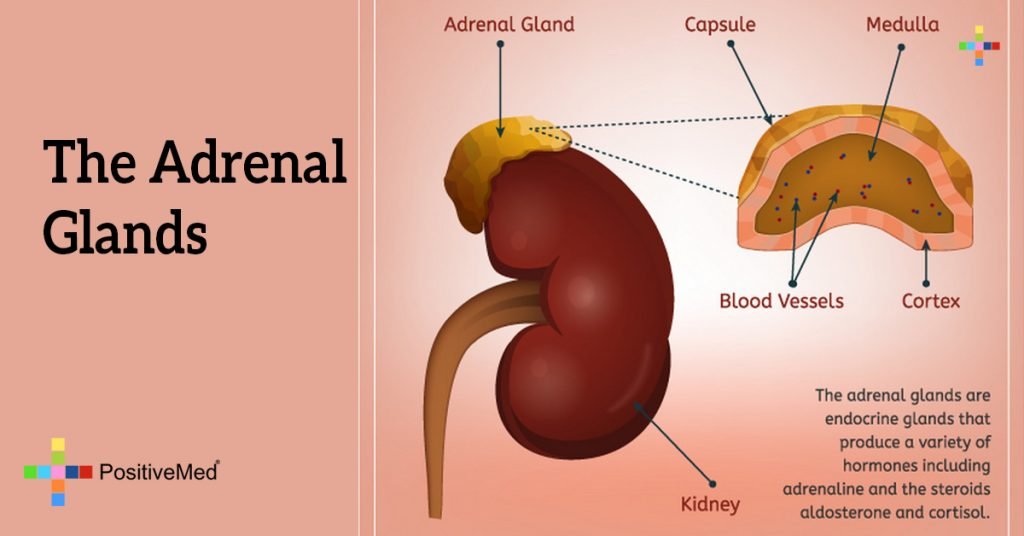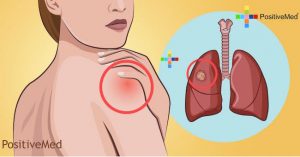
The Adrenal Glands
–by Dr. Michael L. Johnson
The adrenal glands are small, triangular glands located on top of both kidneys. An adrenal gland is made of two parts–the outer region, called the adrenal cortex, and the inner region, called the adrenal medulla.
The function of the adrenal glands
The adrenal glands work interactively with the hypothalamus and pituitary gland. For example, for the adrenal gland to produce corticosteroid hormones: The hypothalamus produces corticotropin-releasing hormones that stimulate the pituitary gland. The pituitary gland, in turn, produces corticotropin hormones that stimulate the adrenal glands. The adrenal glands make and release corticosteroid hormones. To put it simply, the adrenal glands are your “stress glands.” They are vital to your bodily function in times of stress.
Both parts of the adrenal glands–the adrenal cortex and the adrenal medulla–perform very separate functions.
The adrenal cortex
The adrenal cortex secretes hormones that have an effect on the body’s metabolism, on chemicals in the blood, and on certain body characteristics. The adrenal cortex secretes corticosteroids and other hormones directly into the bloodstream. The hormones produced by the adrenal cortex include:
Corticosteroid hormones:
Hydrocortisone (cortisol). This hormone helps control the body’s use of fats, proteins, and carbohydrates.
Corticosterone. This hormone, together with hydrocortisone, suppresses inflammatory reactions in the body and also affects the immune system.
Aldosterone. This hormone regulates the level of sodium excreted into the urine and maintains blood volume and blood pressure.
Androgenic steroids (androgen hormones). These hormones are converted elsewhere in the body to female hormones (estrogens) and male hormones (androgens); however, these steroid hormones are produced in much larger amounts by the ovaries in women and testes in men.
The adrenal medulla:
The adrenal medulla, the inner part of the adrenal gland, is not essential to life but helps a person cope with physical and emotional stress. The adrenal medulla secretes the following hormones:
Epinephrine (also called adrenaline): This hormone helps the body to respond to a stressful situation by increasing the heart rate and force of heart contractions, facilitates blood flow to the muscles and brain, causes relaxation of smooth muscles, helps with conversion of glycogen to glucose in the liver, and other activities. Adrenaline also holds magnesium in the blood. Magnesium is important for…
–Proper bone formation
–Maintains normal muscle function
–Releases energy from muscle storage
–Regulates body temperature
–Proper absorption of calcium
Low magnesium at the neuron (the nerve cell) can lead to the production of protein kinase C2, which in turn, can increase inflammatory arachidonic acid!
Norepinephrine (also called noradrenaline): This hormone has little effect on smooth muscle, metabolic processes, and cardiac output, but has strong vasoconstrictive effects, thus increasing blood pressure.
Over the years, I have found that chronic depression is usually associated with adrenal dysfunction.
The adrenal glands need ALL of the following to work properly…
#1: Water (GOOD QUALITY…distilled or filtered)
#2: Salt (Pink Salt NOT highly-processed white salt)
#3: B vitamins (Natural, live-source NOT coal-tar derived petroleum-based synthetic) – I use Max B-ND from Premier Research Labs (PRL) which I have found to be the best on the market.
#4: Vit C (Natural, live-source, NOT ascorbic acid!) Again, I use PRL’s Vitamin C.
#5: 5 or more hours of continuous sleep to make adrenaline!
#6: The patient has to be off all of the adrenal killers…caffeine, alcohol, and sugar.
As a side note, patients that feel groggy in the morning or have a hard time waking up in the morning usually suffer from an adrenal problem. Patients that have difficulty falling asleep at night usually suffer from a gall bladder problem and patients that wake up in the middle of the night and cannot fall back to sleep usually have a stomach problem.
The adrenal glands can be successfully addressed via diet and by using proper nutritional supplemental protocols. I use Max B-ND, Vitamin C, Pink Salt, AdrenaVen, and/or Adaptogen R3 from Premier Research Labs (PRL) to support the adrenals.
Adaptogen R3 will decrease hormones that are high and increase hormones that are low. I only use Premier Research Labs (PRL) nutritional supplements in my office because they are natural, live-source nutritional supplements that are excipient-free.
If you have any questions, please email Dr. Johnson at [email protected].
About The Author: Dr. Michael L. Johnson is a Board-Certified Chiropractic Neurologist and has been in private practice in Appleton, WI since 1983. He is the author of five books. His first is What Do You Do When the Medications Don’t Work?—A Non-Drug Treatment of Dizziness, Migraine Headaches, Fibromyalgia, and Other Chronic Conditions is available on Amazon.com. Dr. Johnson’s second book, You Can Beat Cancer…Naturally!, his third book, You Can Beat Thyroid Disease…Naturally!, his fourth book, You Can Beat Fibromyalgia…Naturally!, and his fifth book, You Can Beat Autoimmune Conditions…Naturally! are all available as a FREE download e-book at www.askdrjohnson.com. His sixth book, You Can Beat Heart Disease…Naturally!, will be released later this spring. Dr. Johnson’s YouTube and Facebook pages are at “Dr. Michael Johnson.”
Dr. Michael L. Johnson is a Board-Certified Chiropractic Neurologist and has been in private practice in Appleton, WI since 1983. He is the author of five books. His first is What Do You Do When the Medications Don’t Work?—A Non-Drug Treatment of Dizziness, Migraine Headaches, Fibromyalgia, and Other Chronic Conditions is available on Amazon.com. Dr. Johnson’s second book, You Can Beat Cancer…Naturally!, his third book, You Can Beat Thyroid Disease…Naturally!, his fourth book, You Can Beat Fibromyalgia…Naturally!, and his fifth book, You Can Beat Autoimmune Conditions…Naturally! are all available as a FREE download e-book at www.askdrjohnson.com. His sixth book, You Can Beat Heart Disease…Naturally!, will be released later this spring. Dr. Johnson’s YouTube and Facebook pages are at “Dr. Michael Johnson.”
© 2013 Dr. Michael L. Johnson





